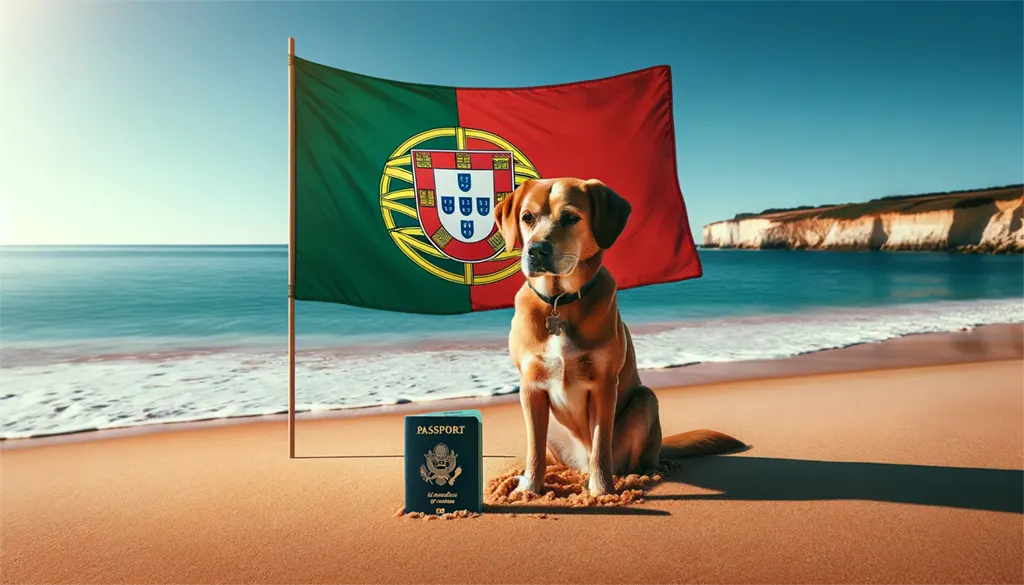More than booking a flight
In this guide, we’ll dive into the essential legal requirements, ensuring your canine companion’s transition is as smooth and stress-free as possible. From necessary documentation to health and safety protocols, we’re here to help you navigate through every step of this process. So, grab a cup of coffee, and let’s start this adventure together – your pooch will thank you for it!
General legal requirements for importing dogs to Portugal
Moving to Portugal with your furry friend in tow means navigating through a series of important legal requirements. Let’s explore the three essentials, ensuring your dog’s transition into this beautiful country is both smooth and compliant.
Documenting Your Dog’s Journey
If you’re coming from within the EU, an EU Pet Passport is essential. This passport records your dog’s identification, microchip number, and vaccination history, including rabies.
For those moving from outside the EU, a health certificate is required. This certificate, issued by a government-approved veterinarian not more than 10 days before your pet arrives in the EU, documents your pet’s health status and vaccinations.
Rabies Vaccination: A Critical Requirement
Rabies vaccination is mandatory for all dogs entering Portugal. The vaccine must be administered at least 21 days before entering the country, ensuring your pet’s protection against this disease. The vaccine should either be an inactivated or a recombinant type, complying with the standards of the World Organisation for Animal Health (OIE).
For dogs within the EU, this vaccination detail is recorded in the EU Pet Passport, a document that becomes a travel necessity for your pet.
However, the scenario changes slightly for dogs from countries with a higher incidence of rabies. These dogs need to undergo an additional step – a rabies antibody titer test. The process involves drawing a blood sample at least 30 days after the rabies vaccination. This sample is then sent to an EU-approved laboratory for testing. The catch? Your furry companion can only enter Portugal three months after this test, provided the results are within the acceptable antibody levels.
Identification via Microchipping
Identification is key, and in Portugal, this comes in the form of a microchip. Every dog entering the country must be implanted with a microchip that adheres to ISO standards 11784 or 11785. This step is essential before the rabies vaccination, as the microchip number needs to be recorded on all veterinary documents. This tiny device ensures that your pet can be easily identified and linked to you, their owner.
Puppies, Breed-Restrictions & More
Importing dogs to Portugal involves understanding specific scenarios that require extra attention. This includes Portugal’s breed-specific legislation, rules for importing puppies, and regulations for dogs imported for commercial purposes.
Know the Restricted Breeds
In Portugal, certain dog breeds are subject to specific regulations due to their perceived temperament and strength. These breeds include the
- American Staffordshire Terrier,
- Fila Brasileiro (Brazilian Mastiff),
- Dogo Argentino (Argentinian Mastiff),
- Rottweiler, Staffordshire Bull Terrier,
- and Tosa Inu.
Commercial Dog Import Regulations
Owners of these breeds need to be aware of additional legal requirements such as mandatory registration, special insurance, and adherence to rules regarding muzzling and leashing in public areas.
For dogs imported to Portugal for commercial reasons, such as breeding, sale, or dog shows, there are stricter regulations. This includes comprehensive health screenings, possible quarantine measures, and obtaining specific import permits. Compliance with Portugal’s animal welfare laws is critical, as these laws govern the treatment and care of animals involved in commercial activities. It’s vital to obtain all necessary permissions and to understand the detailed requirements to avoid legal complications.
By paying close attention to these special considerations, you can ensure a successful and compliant process when importing dogs to Portugal, whether it’s a specific breed, a young puppy, or for commercial purposes. It’s about adhering to the legal framework to safeguard the wellbeing of your canine companion in their new environment.

Legal Responsibilities of Dog Owners in Portugal
As a dog owner in Portugal, you have several legal responsibilities. These include ensuring your dog is always properly identified, keeping up with vaccinations, and adhering to public safety laws, especially if you own a breed that’s subject to specific regulations. Responsible pet ownership also means being mindful of your dog’s impact on neighbors and the community.
Mandatory Registration and Fees: What You Need to Know
In Portugal, registering your dog is mandatory and essential for responsible pet ownership. This registration must be completed with the local municipality where you reside. The registration process typically involves a fee, which can vary depending on the municipality. This fee contributes to the local government’s efforts in managing pet populations and ensuring public safety. It’s important to budget for this expense and complete the registration promptly upon arrival in Portugal.
Staying Informed: Contact Portuguese Embassies
For the most current and detailed information, contacting the Portuguese embassy or consulate in your country before your move is advisable. They can provide up-to-date details on pet import regulations, mandatory requirements, and any recent changes in the law. Staying informed is key to a smooth transition for you and your pet to life in Portugal.
Ensuring a Smooth Transition to Portugal
Moving to Portugal with your dog can be a seamless experience with the right preparation and understanding of the local culture. Here are some practical tips and best practices to ensure a smooth import process, along with advice on transport, handling, and adapting to the Portuguese way of life with your pet.
Best Practices for a Smooth Import Process
Start planning well in advance of your move. Gather all necessary documents, including your dog’s health certificate or EU Pet Passport, and ensure all vaccinations, especially rabies, are up to date. Research breed-specific regulations if applicable to your dog. Consider hiring a pet relocation service for expert guidance and to handle complex logistics, ensuring all legal requirements are met.
Recommendations for Transport and Handling
Choose a pet-friendly airline with a strong track record of safe animal transport. Acquaint your dog with their travel crate well before the journey to reduce stress. Ensure the crate is IATA-compliant, well-ventilated, secure, and comfortable. During the journey, provide your dog with familiar items like a favorite toy or blanket for comfort. Check with the airline for specific rules regarding feeding and watering during the trip.
Cultural Considerations for Dog Owners in Portugal
Understanding and adapting to local customs and expectations regarding pets is crucial. In Portugal, dogs are generally welcome in public spaces, but always keep your dog on a leash and clean up after them. Be mindful of noise levels, as excessive barking can be frowned upon in residential areas. Explore local dog parks and beaches where your dog can socialize and exercise. Lastly, engage with local pet owners or communities for insights and recommendations on vets, pet stores, and dog-friendly activities.
Wrapping Up: Can I bring my Dog to Portugal? Yes, You Can!
Since we have answered the question “Can I bring my dog to Portugal?”, let’s wrap it up. As you prepare to embark on your new adventure in Portugal with your dog, remembering the key points of this guide will ensure a smooth transition. From understanding the necessary documentation, such as the EU Pet Passport or health certificates, to adhering to rabies vaccination requirements and microchipping norms, each step is crucial. Special considerations for specific breeds, puppies, and dogs imported for commercial purposes highlight the importance of attention to detail. Navigating the Portuguese legal framework, from mandatory registration to embracing local animal welfare laws, underscores your responsibility as a pet owner.
Compliance with these regulations is not just about following the law; it’s about ensuring the welfare and safety of your beloved pet in a new environment. Adapting to cultural nuances and engaging with local pet communities will enhance your experience and integration into Portuguese life.
As you and your pet start this exciting chapter in Portugal, remember that these regulations and guidelines are in place to protect the well-being of your furry friend and the community. Embrace these responsibilities with care and enthusiasm, and you’ll find that Portugal offers a warm and welcoming atmosphere for both you and your pet. Welcome to your new home!
Resources
For further information and guidance, the following resources provide valuable insights and contacts to assist you in your journey to Portugal with your pet:
Portuguese Government Websites and Contacts:
General Directorate of Food and Veterinary (DGAV): The primary authority for pet import regulations in Portugal. Website: www.dgv.min-agricultura.pt
Portuguese Municipalities: For local registration and information. Contact details can be found on individual municipal websites.
EU Pet Travel Guidelines:
European Commission – Pet Movement: Detailed information on EU regulations regarding pet movement. Website: European Commission – Animal Health and Welfare
EU Animal Health Law: Comprehensive guidelines on animal health requirements within the EU.
Embassy Contacts:
Portuguese Embassies and Consulates: For country-specific information and regulations. A directory can be found at Ministry of Foreign Affairs Portugal
Your home country’s embassy in Portugal: For assistance and advice specific to your nationality.
Animal Welfare Organizations:
Liga Portuguesa dos Direitos do Animal (LPDA): Offers information on animal welfare and rights in Portugal. Website: www.lpda.pt
Animal: Portuguese organization focused on animal rights and welfare. Website: www.animal.org.pt
These resources offer a wealth of information and should be your first point of call for the most current and comprehensive advice on importing your pet to Portugal. Remember, regulations can change, so it’s always best to verify the latest information. If you have any specific questions, please feel free to contact me.
